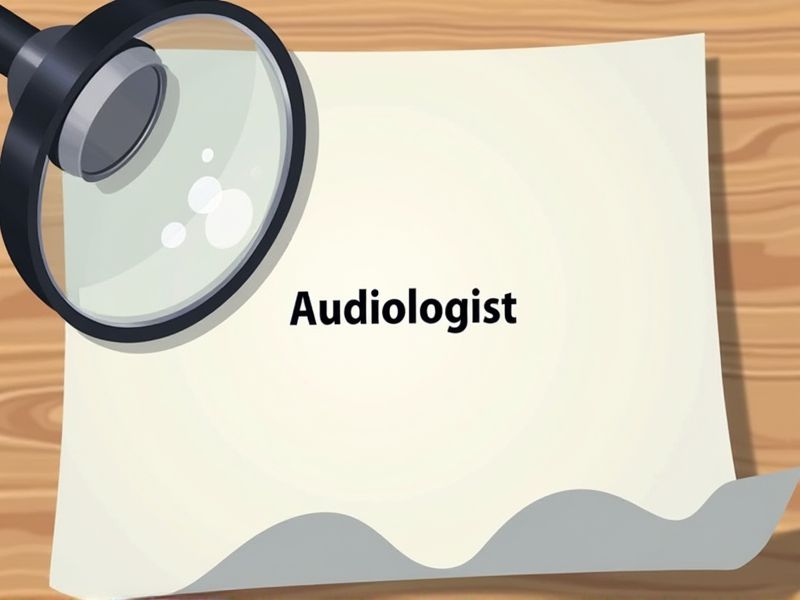
Audiologists specialize in diagnosing and treating hearing disorders, requiring advanced skills and knowledge to ensure accurate assessments and effective interventions. Certifications validate an audiologist's expertise, instill patient confidence, and often meet state or organizational requirements. These credentials demonstrate proficiency in areas like pediatric audiology, vestibular assessment, and hearing aid management. Here are some important certifications you may need as an audiologist.
Certificate of Clinical Competence in Audiology (CCC-A)
Obtaining the Certificate of Clinical Competence in Audiology (CCC-A) reflects an audiologist's adherence to a recognized standard of excellence, ensuring a high level of expertise in diagnosing and treating auditory disorders. This certification often serves as a benchmark for employers and patients to verify professional competence and qualifications within the field. It may be a prerequisite for licensure in certain jurisdictions, impacting an audiologist's ability to practice legally. The credential also supports ongoing professional development through a commitment to continuing education, aligning with evolving industry standards and practices.
State Audiology License
State Audiology License ensures that audiologists meet specific educational and clinical practice standards, protecting patient safety by confirming their competency. It facilitates professional accountability, as licensed audiologists are subject to regulatory oversight, which can mitigate malpractice risks. The license enables audiologists to access insurance reimbursements and participate in governmental healthcare programs, thus broadening their service delivery capabilities. Licensing also standardizes the profession within the state, promoting trust and reliability among patients seeking auditory healthcare services.
Certified Hearing Instrument Specialist (CHIS)
Certified Hearing Instrument Specialists (CHIS) provide expertise in fitting and managing hearing aids, which supplements the audiologist's diagnostic capabilities. Their certification ensures they stay updated on the latest technology and techniques, enhancing patient care. With specialized knowledge in programmable settings, they can tailor hearing aid functions to the specific needs of patients. Collaborating with audiologists, CHIS can assist in creating comprehensive hearing care plans that improve overall patient outcomes.
Certification in Vestibular Assessment and Rehabilitation
Audiologists with certification in vestibular assessment and rehabilitation can better diagnose and treat balance disorders, which enhances patient care. With specialized training in this area, audiologists become proficient in utilizing advanced diagnostic tools and techniques. This expertise can lead to improved patient outcomes and increased patient trust. Certification often opens up new career opportunities and further specialization within the audiology field.
Certified Cochlear Implant Audiologist (CCIA)
The CCIA qualification ensures audiologists possess specialized expertise in managing cochlear implants, which contributes to better patient outcomes. Hospitals and clinics increasingly require audiologists to have CCIA credentials as part of compliance with industry standards. Complexities involved in cochlear implant technology demand professionals who can efficiently handle device programming and troubleshooting. Formal CCIA certification enhances patient trust and expands professional career prospects for audiologists.
Pediatric Audiology Certificate
Audiologists with a Pediatric Audiology Certificate possess specialized knowledge, allowing them to accurately assess and diagnose hearing issues in children. This certification often leads to improved patient outcomes due to expertise in pediatric-specific hearing technologies and strategies. Parents and healthcare providers gravitate towards certified audiologists, increasing trust and demand for their services. Holding this certificate enables audiologists to stay updated on the latest research and techniques in pediatric hearing healthcare, ensuring their skills remain relevant and effective.
Auditory Processing Disorders (APD) Certification
Auditory Processing Disorders (APD) Certification equips audiologists with specialized knowledge to accurately diagnose APD, which enhances patient care quality. Without this certification, audiologists may struggle to differentiate APD from other auditory issues, potentially leading to misdiagnosis. Certification provides standardized assessment techniques that improve diagnostic efficacy. In the growing field of audiology, possessing APD certification also strengthens professional credibility and aligns practice with current industry standards.
Certificate in Geriatric Audiology
With an aging population, the incidence of hearing loss in older adults is rising, creating a growing need for specialized care in geriatrics. A Certificate in Geriatric Audiology equips audiologists with targeted skills to address age-related auditory decline. This specialized training enhances their ability to diagnose and manage complex hearing disorders in elderly patients. Improved expertise results in better patient outcomes and satisfaction in geriatric populations.
Advanced Certification in Tinnitus Management
The rising prevalence of tinnitus, affecting millions globally, necessitates specialized knowledge for effective management. An advanced certification provides audiologists with evidence-based techniques to improve patient outcomes. As tinnitus can significantly impact quality of life, tailored interventions are essential to address individual needs. Continuous advancements in research and technology require audiologists to possess updated skills and knowledge.
Continuing Education Certificate in Audiologic Medicine
Continuing education in audiologic medicine equips audiologists with the latest advancements in diagnostic and therapeutic techniques, resulting in improved patient outcomes. Maintaining up-to-date certifications ensures compliance with regulatory standards and strengthens professional credibility. Exposure to new research through education allows audiologists to implement evidence-based practices more effectively. As the prevalence of hearing disorders rises, ongoing education helps audiologists address diverse patient needs with enhanced expertise.
Summary
When you pursue certifications as an audiologist, your expertise in diagnosis and treatment significantly expands. This leads to greater trust from patients and colleagues, boosting your professional reputation. Enhanced skills often translate to higher job satisfaction and potential salary increases. These certifications also open new career pathways and specialization opportunities in audiology.
